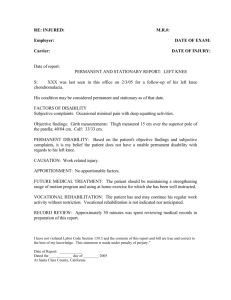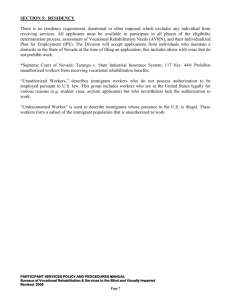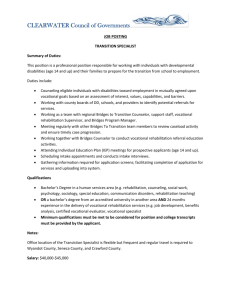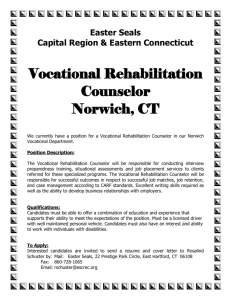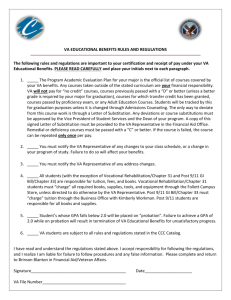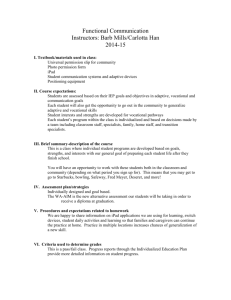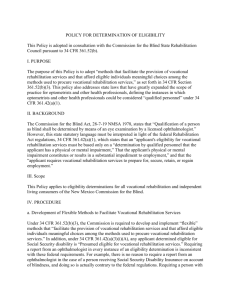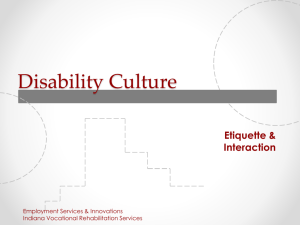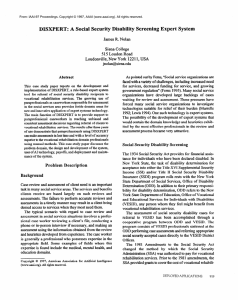Demystifying Functional Performance
advertisement
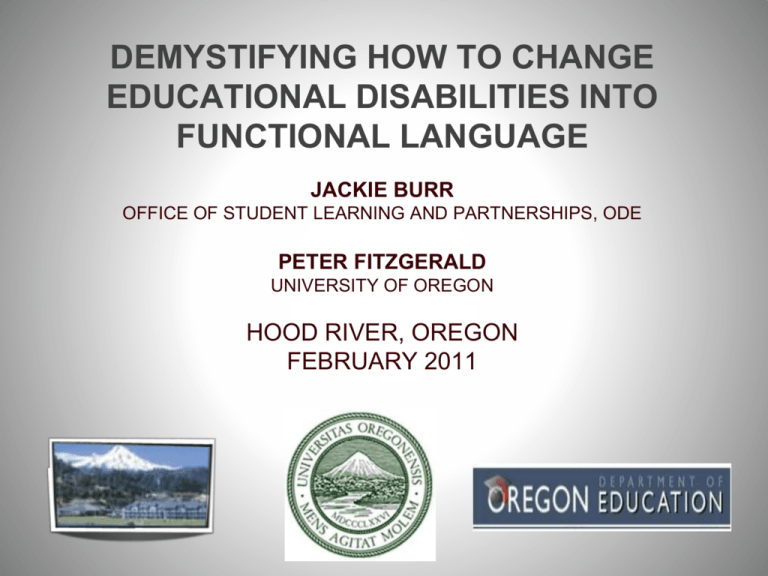
DEMYSTIFYING HOW TO CHANGE EDUCATIONAL DISABILITIES INTO FUNCTIONAL LANGUAGE JACKIE BURR OFFICE OF STUDENT LEARNING AND PARTNERSHIPS, ODE PETER FITZGERALD UNIVERSITY OF OREGON HOOD RIVER, OREGON FEBRUARY 2011 So…What’s The Big Deal? FACT: Educators understand academics better than functional skills! FACT: Educators have a hard time explaining how doing poorly in school translates into doing poorly in work--life! FACT: Frequently, LIFE demands to know what you can do rather than what you have learned! Let’s Get Our Terms Straight! Academic Achievement Academic achievement generally refers to a child’s performance in academic areas Examples: reading or language arts, math, science, and history. Functional Performance Skills or activities in which the ability to function is significant to successful independence, education and/or employment. Examples: dressing, eating, going to the bathroom; social skills such as making friends and communicating with others; behavior skills, such as knowing how to behave across a range of settings; and mobility skills, such as walking, getting around, going up and down stairs. Source: NICHY.org Maybe Two More Terms? Adaptive Behavior Cognitive Skills The age-appropriate behaviors necessary for people to live independently and to function safely and appropriately in daily life. Adaptive behaviors include real life skills such as grooming, dressing, safety, safe food handling, school rules, ability to work, money management, cleaning, making friends, social skills, and personal responsibility. The underlying brain skills that make it possible for us to think, remember and learn. These are the skills that allow us to process the huge influx of information we receive each and every day at work, at school and in life. Source: About.com Source: LearningRX.com Differences in What Agencies Need and Want! Schools want: Agencies want: 1. To know how the disability affects the ABILITY to make progress in the general curriculum? 1. To know how the disability affects the ABILITY to do things like work, live independently, care for oneself, etc. 2. To know whether or not there is an impairment to a MAJOR LIFE FUNCTION that requires reasonable accommodation? 2. To know whether or not there is an impairment to a MAJOR LIFE FUNCTION that requires reasonable accommodation or a service they can or have to provide? Why are we doing this? • SOP: A school district must provide the student with a summary of the student's academic achievement and functional performance. • PLAAFP: The individualized education program (IEP) must include a statement of the student’s present levels of academic achievement and functional performance. Transition Smoothly from High School to Work Functional Areas Interpersonal Skills Motor Skills Self Care Self Direction Communication Work Tolerance Work Skills See attachment “What is Functional Performance?” Communication Education Vocational Rehabilitation • Is the student able to speak clearly enough to be understood by peers and staff? • Do you often have to ask the student to repeat herself? • Can the student clearly tell the teacher/aide what he needs? • Is the person’s speech difficult to understand? • Is repetition often necessary? • Is the person able to communicate his/her needs effectively? Interpersonal Skills Education Vocational Rehabilitation • Does student have friends? Does student like to work on teams? • Does student answer when spoken to? • Does student know when teacher is giving constructive criticism? • Does person enjoy being with other people or prefer to be alone? • Is person able to recognize social cues? • Is person able to handle constructive criticism Mobility Education • Can the student get from one classroom to another? • Is student able to participate in physical education? • Do any of the 13 IDEA disability categories impair mobility? • Does student have accommodations /modifications on IEP to improve access due to mobility impairments? Vocational Rehabilitation • Does person have control and coordination of fine/gross motor movements? • Does the person need assistive devices to mover around? • Does the person need specialized transportation? Self Care Education Vocational Rehabilitation • Is student able to get to class on time and organize work for each class? • Does the student have trouble deciding what he wants to do after he completes high school? • Is the student impulsive and/or behave without thought toward consequences? • Does the person require an attendant, monitoring to prevent injury, or to manage money? • Does the person have difficulty making decisions? • Does the person lack “common sense” ability? • Is the person unaware of the consequences of behavior? Self Direction Education Vocational Rehabilitation • Is student able to read/listen to and follow directions? • Does the student complete homework assignments? • Does the student learn appropriate behavior in the resource room but then cannot generalize that appropriate behavior to her general classes? • Is the person able to follow directions? • Is the person able to complete tasks? • Does the person have difficulty generalizing, transferring and/or assimilating information (written, spoken, receptive or expressive)? Work Skills Education • Does the student work on an assignment for a reasonable amount of time? • Is the student often tardy for class or school? • Can the student start an assignment without being told to start? Vocational Rehabilitation • Is the person able to maintain attention to a task for a reasonable amount of time? • Is the person able to tell time and be on time for work? • Does the person take initiative or does he need cues to perform? Work Tolerance Education Vocational Rehabilitation • Does the student have a shortened school day? • Can the student sit still for a regular class period? • Does the student get along with teachers, aides, and fellow classmates? • Can the person work for an eight hour day? • Can the person sit or stand for more than two hours? Lift? • Is the person able to establish adequate working relationships, especially with coworkers and supervisors? LET’S SEE HOW IT MIGHT WORK! The Process • High School Student who reads at 3rd Grade Level. • Reading comprehension below grade level. Educational Disability Functional Performance • Reading Technical Manuals or Instructions will be difficult. • May need to ask for help with a complex task. • May avoid cooking using recipes. • May have trouble following medication directions that require reading. Adaptive Behavior See Handout “The Process—Angela” The Process Specific to Jack (See Handout) • Without calculator scores 16% on Key Math Assessment. • 50% and 60% Decoding and Comprehension Reading Skill Respectively. Educational Disability Functional Performance • Without a calculator, work related math tasks will be subject to error. • Will need help with scheduling future work events on a calendar. • Will need help with tasks that require reading. • Getting places using bus schedules will be difficult. • Without adaptive technology, recipes and other daily living tasks will be hard to master. Adaptive Behavior See Handout “The Process—Jack” Jackie Burr Peter FitzGerald (503) 947-5639 (503) 522-6973 Jackie.burr@state.or.us petefitz@q.com http://www.ode.state.or.u s/search/results/?id=266 http://www.ytporegon.org/
